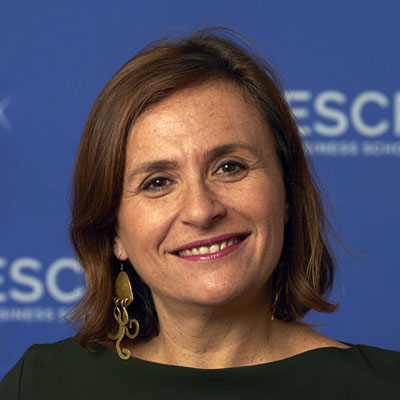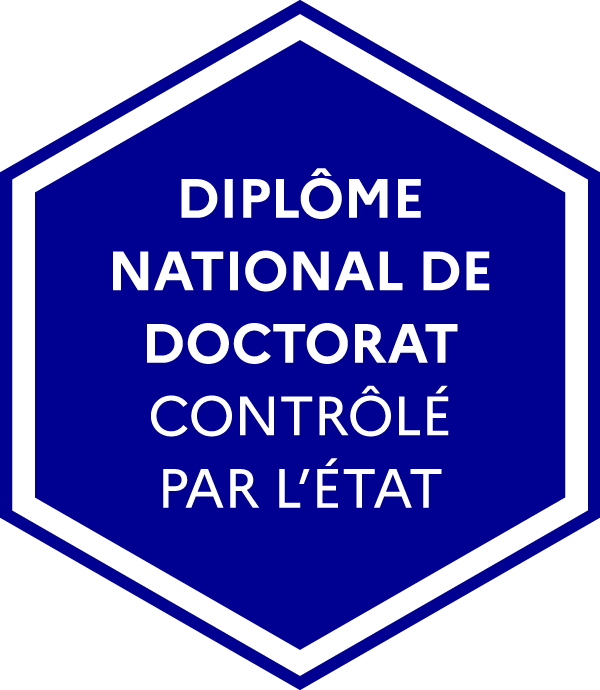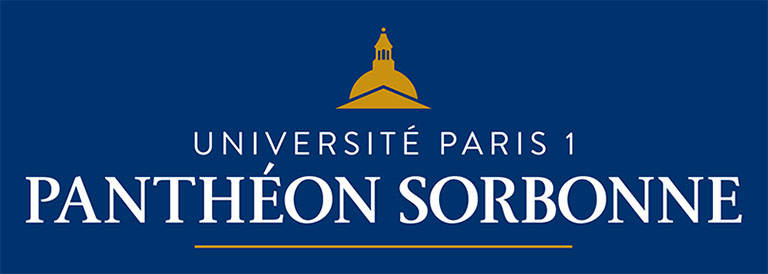Paris Doctoral Programme
Educate and train future top international researchers - ambassadors of ESCP research excellence, future peers and collaborators in research.
Join our unique programme in the vibrant city of Paris and become part of our dynamic PhD students’ community!
Doing a PhD is a great intellectual and personal journey. It is the foundational step of a stimulating professional trajectory. We have developed a four-year programme that is demanding but helps each student to reach international standards of research quality. Our Ph.D programme offers a great environment where our PhD students are provided not only with the indispensable academic and financial guidance but also with social and moral support. This supportive environment is a cornerstone for their academic fulfilment.
Our distinctive objective is to strive for academic excellence and at the same time produce “relevant” and impact-oriented knowledge for society and organisations.

Prof. Valentina Carbone
Dean, PhD Programme

Our programme values
Knowledge Diversity
Doing the PhD programme gives an opportunity to invest in one of the five specialisation tracks. The students will explore several methodological perspectives. In addition, we also foster transversal initiatives across knowledge fields and methodologies. We value exchanges with PhD students from our Berlin campus and we actively support international exposure of research activities.
Research Collaboration
If research is sometimes considered as an individual, even solitary, activity, at ESCP the students will be part of a research community encompassing our six European campuses. During your four-year curriculum, PhD students will benefit from close supervision in departments and will learn through co-writing with the faculty staff. Your success is our success, and vice versa.
Professional Ambition
Doing the ESCP programme gives the opportunity to open new and ambitious professional horizons. Whatever the post doctorate objectives - joining the academic or the business research world-, we support ambitions to go “one step further”. Joining a top university research team; boosting the R&D activities of a cutting-edge organisation.
Key facts
Supervisors
47
Professors habilitated to supervise Doctoral Research
Key Performance Indicators
101
Defences since the launch of the programme in 2003
Number of enrolled students
63
Students
International
16
Nationalities
Applications
Admission Calendar for September 2026 Intake
- Opening of application platform
19 January 2026 - 1st round
- Deadline for submitting applications:
23 February 2026
- Interview dates with the admission committee:
18-19-20 March 2026
- 2nd round
- Deadline for submitting applications:
27 April 2026
- Interview dates with the admission committee:
29 May, 1-2 Jun 2026
Paris Doctoral Programme
Curriculum
The main goal of the PhD programme is to help its students acquire the fundamental skills of a teacher-researcher.
Through these teachings, students work towards their thesis, a research project of great importance and of the utmost quality. Apart from the dissertation work, the doctoral programme provides a general and thorough research training, a chosen field of specialisation and a teaching and educational training.
The first year of the doctoral programme integrates and delivers an advanced Research Master (Diplôme en Sciences du Management)
Year 1
Core Courses
(all students)
- Research Design
- Research as a creative Practice
- Planetary boundaries
Your choice among 3 specialisation tracks
- Econometrics
- Quantitative Methods
- Qualitative Methods
Your choice among 6 specialisation tracks
Finance
Entrepreneurship
Accounting & Management Control
Management & Organisations
Marketing
Sustainability
Summer Paper
Year 2
Thesis Development
Professional Seminars
- Writing Workshops Learning by Doing
- Advanced quantitative methods workshop
- Art of Teaching
- Using Generative AI in Research
- Art of Teaching
Year 3
Thesis Development
Professional Seminars
- Writing Workshop Learning by Doing
- Advanced quantitative methods workshop
- Reflexivity & Career Exploration
- Personal Branding
- Get Ready for the Job Market
Outside the walls
- Develop your research and teaching skills
- Present your papers in conferences
- Go to a research visit abroad
Year 4
- Placement
Thesis Completion
Follow-up the thesis work
Progress Workshop
The doctoral students each present their progress in their research study at least once per year. The objective is to no evaluate the work but to help the student in his or her research orientation. This workshop gathers doctoral students, the thesis director, the programme director and other professors chosen internally or externally in accordance with the thesis subject.
Annual Assessment
Each doctoral student presents a general result of his or her activities (thesis, publications, teachings, assistance, etc.) and his or her projects planned for the following year. The objective is to validate the work done in the previous year and to prepare the stages planned for the following year. The participants are the thesis director, the programme director and possibly other professors chosen internally or externally. It takes place in September.
Pre Defence
With potential members of the jury (referees) about six months before the end of the project.
Visiting Opportunities
Increasing the academic excellence and network’s strength of all PhD students is important to us. The Paris PhD programme welcomes visiting PhD students. Visiting PhD students, our faculty and our PhD students all benefit from the opportunity to share on common research interests.
What visiting PhD students at ESCP are offered:
- The opportunity to interact with your ESCP faculty sponsor and with the PhD students of the programme
- Free access to the PhD courses given during your stay
- Possibility to present your doctoral research in a research seminar
- Access to a workspace in the doctoral rooms (shared spaces with computers)
- Access to the library and cafeteria
- Note that we do not offer any financial support in case your application is successful.
Visiting
We would consider your application as long as your visit is supported by one permanent faculty member from ESCP. For your application as a visiting PhD student, we would ask for :
- A support letter from your sponsor at ESCP,
- A summary of your dissertation project,
- An updated CV,
- A scan of an ID,
- A proof of registration in the PhD programme of your university.
The Dean of Paris PhD Programme will make a decision based on the pieces above and will inform you on the outcome.
Applications
Admission Calendar for September 2026 Intake
- Opening of application platform
19 January 2026 - 1st round
- Deadline for submitting applications:
23 February 2026
- Interview dates with the admission committee:
18-19-20 March 2026
- 2nd round
- Deadline for submitting applications:
27 April 2026
- Interview dates with the admission committee:
29 May, 1-2 Jun 2026
Paris Doctoral Programme
Areas of Specialisations
When applying to the programme, you need to express your interest for one of our six specialisations.
Within one of these areas, you will develop your PhD. thesis topic based upon your research interests. For each area, you will find some examples of PhD theses recently defended.
Finance
Corporate finance, asset pricing and banking
Students are trained to apply econometric methods but also to develop theoretical models.
Thesis examples:
- “Anti-Corruption Laws and Firms Behavior: Lessons from the FCPA Enforcement Activity” (Olivier Greusard, under the supervision of Prof. P. Bunkanwanicha, July 19)
- “Non-Regulatory Incentives and Bank Behavior: the Stock-market, Taxes and Social Capital” (José Martin Flores, under the supervision of Prof. C. Moussu, June 19)
- “Bank-firm relationships, competition and asymmetric information”(N. Taillet, under the supervision of Prof. M. Troege, 2022)
Entrepreneurship
Uncertainty, behaviour (effectuation), cognition, sustainable entrepreneurship and legitimation of creative projects
Students tackle issues related to contemporary and emerging entrepreneurial theories.
Thesis examples:
- Conforming or Rejecting Gender Stereotypes among Women Entrepreneurs (Diana Garcia Quevedo, under the supervision of Prof. Caroline Verzat, 2024)
Accounting & Management Control
Social studies of accounting
Students unpack the control and performance management issues facing organisations.
Thesis examples:
- « Ethique, quantification et évaluation dans un appel d’offres : la modernisation de l’Etat au prisme de la sélection des consultants » (Eléonore Brouard, under the supervision of Prof. Claire Dambrin,2024)
- “The imaginary infrastructure of AI: an accounting technology” (Elise Berlinski, under the supervision of Prof. Philippe Zarlowski, 2020)
Management & Organisation
Strategy, organisation, human resource, and organisational change
Students tackle issues from competitive analysis to the study of individual behaviours.
Thesis examples:
- « Incumbents' response strategies to category emergence in the digital platform age. The case of European retail banking (2013-2023) »(Matilde Guilhon, under the supervision of Prof. Régis Coeurderoy, 2024)
- « Travail et non-travail : Telle est la gestion ? Une étude du travail, du professionnalisme et de leurs (non)sens à la lumière des activités de non-travail au bureau » (Sophie Rauch, under the supervision of Prof. Hervé Laroche, 2023)
Marketing
Consumer behaviour, branding, planning and promotion, channel management, and digital marketing
Students tackle issues pertaining to consumer, corporate and organisational phenomena.
Thesis examples:
- “A sense of who we are”: Towards a better understanding of family identity negotiation through consumption(Mathilde Lapostolle, under the supervision of Prof. Julien Schmitt)
- “Influence de la culture sur les réponses face à une violation de données personnelles” (Christelle Aubert-Hassouni, under the supervision of Prof. S. Macé, 2023)
Sustainability
Sustainability challenges and transitions in management research
Students tackle issues linked to “grand challenges”, environmental and social transitions.
Thesis examples:
- “Building bridges to overcome organisational distance in the supply network” (Anne Ratsimandresy, under the supervision of Joe Miemczyk, 2023)
It is always more fruitful that your research issue fits with the research interests of the faculty.
We invite you to visit the webpages of our faculty.
A HDR professor (Habilitation à Diriger les Recherches) will be necessary to supervise a PhD thesis. However, we favour collaborative supervision mechanisms, in particular across campuses. We encourage you to carefully explore our full faculty profiles to have a global perspective of the many research opportunities the ESCP environment can provide.
Applications
Admission Calendar for September 2026 Intake
- Opening of application platform
19 January 2026 - 1st round
- Deadline for submitting applications:
23 February 2026
- Interview dates with the admission committee:
18-19-20 March 2026
- 2nd round
- Deadline for submitting applications:
27 April 2026
- Interview dates with the admission committee:
29 May, 1-2 Jun 2026
Paris Doctoral Programme
PhD Community
Applications
Admission Calendar for September 2026 Intake
- Opening of application platform
19 January 2026 - 1st round
- Deadline for submitting applications:
23 February 2026
- Interview dates with the admission committee:
18-19-20 March 2026
- 2nd round
- Deadline for submitting applications:
27 April 2026
- Interview dates with the admission committee:
29 May, 1-2 Jun 2026
Paris Doctoral Programme
Admissions
You can apply with your own project or respond to the projects presented here.
Requirements
Applicants to the ESCP PhD Programme must hold a Master degree or equivalent and must have a solid knowledge of English.
The admission process is composed of 3 steps
The official online application process: completion of the application form by candidates before the deadline specified in the Admission Calendar and provision of the required documents.
Candidates selected by the admissions jury after a first screening will have half an hour to present their background and motivation to the interview panel made up of programme directors and faculty members. Alternatively, a video interview can be offered to candidates.
After the interview the selected candidates receive the admission decision of the final selection Committee. Admitted candidates must confirm their acceptance by the deadline indicated in the offer letter.
At the end of the process, only applicants with secure funding will be confirmed.Selection Process
List of required documents
The official online application process: completion of the application form by candidates, before the deadline specified in the Admission Calendar, and provision of the required documents:
- Motivation letter
- Up to date resume
- Research Statement (1500-2000 words)
- 3 recommendation letters (a minimum of 2 academics and 1 professional if relevant). You may download the template here
- copies of diplomas and degrees,
- transcripts of most recent degrees,
- IELTS or TOEFL results as a proof of English language proficiency (required score: IELTS 7, TOEFL 100). Both TOEFL (Test of English as a Foreign Language) and IELTS are serving as a proof of a good working knowledge in English. Non-native English speakers applying to the programme are required to take the test unless they have a university degree from an institution located in an English-speaking country. Test score should not be older than 4 years to be acceptable.
- any research material that might be useful (dissertation, paper...) in .pdf format,
- copy of your ID or passport,
- 1 digital photo,
- application fees (20€) and payment agreement
Your research statement
The research statement (around 4-5 pages long) should give you the opportunity to present a research topic you would like to study. This research topic does not necessarily commit you once for all and leaves room forpossible re-orientations. It must however, give you the opportunity to make a first academic contribution - ie to present a topic with a research question, elements of theory to address your research question, and a first idea of your research design. Your research statement should specify the following points:
- what your research issue is;
- why this research issue makes sense (theoretical perspective);
- why this research issue is relevant (empirical perspective);
- what your research design could be.
This research statement really matters to optimise the match between your objectives and the requirements of a PhD thesis. Of course, we are aware that you are at the beginning of the process. That is why during your first year you are free to consolidate, modify and sometimes redraft your research project.
Your motivation letter
Your motivation letter will help the jury to understand better what your expectations are, and how you see your evolution in the programme and beyond. Entering a post master programme for four years is a huge decision. We need to be mutually convinced that it is really the right choice for you. Do not forget to justify your choice of specialisation or indicate whether you are still open to different options.
Applications
Admission Calendar for September 2026 Intake
- Opening of application platform
19 January 2026 - 1st round
- Deadline for submitting applications:
23 February 2026
- Interview dates with the admission committee:
18-19-20 March 2026
- 2nd round
- Deadline for submitting applications:
27 April 2026
- Interview dates with the admission committee:
29 May, 1-2 Jun 2026
Paris Doctoral Programme
Fees and financials
Tuition Fees
- Year 1: €15,000
- Year 2: €15,000
- Year 3: €15,000
- Year 4: €15,000
However, a legal token registration fee of ± €400 per year for the Doctoral School applies (including CVEC).
ESCP scholarship
ESCP finances a significant proportion of admitted PhD students with a scholarship guaranteed for 4 years. From the 2nd year, this scholarship is combined with a doctoral contract including teaching, tutoring and research assistance for a total of €28,000.
Each candidate can apply for this cost-of-living scholarship, but it cannot be combined with any other external income. These scholarships are granted on the basis of the excellence of the application.
Students who have received a scholarship are exempt from tuition fees, but not from registration fees.
| 1st year | 2nd to 4th year | |
|---|---|---|
| Scholarship | €23,000 | €23,000 |
| Doctoral Contract | €1,500 (conditional – based upon evaluation of candidate’s background) |
€5,000 |
External Fundings
CIFRE (Conventions Industrielles de Formation par la Recherche)
These agreements bring together three partners: a company, a PhD student and a University around a research project, which will lead to a doctoral thesis. The company benefits from an ANRT (Association Nationale Recherche Technologies) subsidy for hiring a PhD student for three years.
Research Projects: Another possibility is the financing of the PhD scholarship by a research project developed in collaboration with one or several companies. The research project can be a stand-alone initiative or supported by one of our chairs at ESCP.
Financial aid from the French Government: In addition to the financial aid for which they are eligible in their country of origin, non-French students can seek grants from the French Ministry of Foreign Affairs. Requests should be sent to the Cultural Department of the French Embassy in the student’s country of origin. PhD students can also apply for European exchange programme grants (Socrates, Erasmus, Phare). This aid cannot be combined with the ESCP scholarship.
Applications
Admission Calendar for September 2026 Intake
- Opening of application platform
19 January 2026 - 1st round
- Deadline for submitting applications:
23 February 2026
- Interview dates with the admission committee:
18-19-20 March 2026
- 2nd round
- Deadline for submitting applications:
27 April 2026
- Interview dates with the admission committee:
29 May, 1-2 Jun 2026


